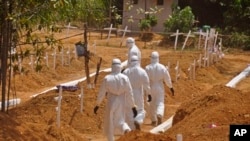Liberia is set to be declared Ebola-free on Saturday. It will have been 42 days since the country’s last known case of the deadly virus. In total, this regional epidemic has infected 26,593 people, killing just over 11,000.
Four thousand, seven hundred and sixteen people are believed to have died of Ebola in Liberia since the virus jumped over the Guinean border 14 months ago. That’s the highest death toll of any country in this regional outbreak.
Now it may be over in Liberia, but for some the celebration is bittersweet.
“This thing was scary and I don’t have words to describe what Ebola did to us in Liberia. We lost a lot of people,” said Patricia Fortee. She tells her kids to stay vigilant and that hand washing is a must.
“I’m not going to shake hands. I’m not going to hug. I’m not going to embrace people. I’m going to speak to you like I used to speak to you when we had Ebola around here,” she said.
Risk remains
Neighboring Sierra Leone and Guinea are reporting 18 confirmed Ebola cases, the lowest weekly total this year but it’s not zero. Health experts say Liberia remains at risk.
Liberia’s economy is in shambles. Many people lost their livelihoods. The agricultural sector needs a kick start. The health system collapsed early in the epidemic and must now be rebuilt. The rainy season looms, bringing with it spikes in malaria and other diseases.
As Ebola surged last September, images of sick Liberians lying on the streets of Monrovia or being turned away from overwhelmed Ebola treatment units galvanized an international response.
Key role of communities
But Dr. Peter Graaff, head of UNMEER, the U.N. Mission for Ebola Emergency Response, says the real credit goes to Liberians.
“It was the communities that self-organized, and it was the communities that understood what this disease was all about," he said. "The government and the international community having worked so closely together and having worked with communities of course made a major contribution, but I think when the history is going to be written about this, the real efforts… and the real bending of the curve was because of the communities themselves.”
He said rapid detection and response can ensure an Ebola epidemic of this scale never happens again.
Some Ebola treatment units will remain in Liberia for now just in case. Others will be dismantled or repurposed. The laboratories must stay open to test any suspicious cases.
Prince Collins contributed reporting from Monrovia.












